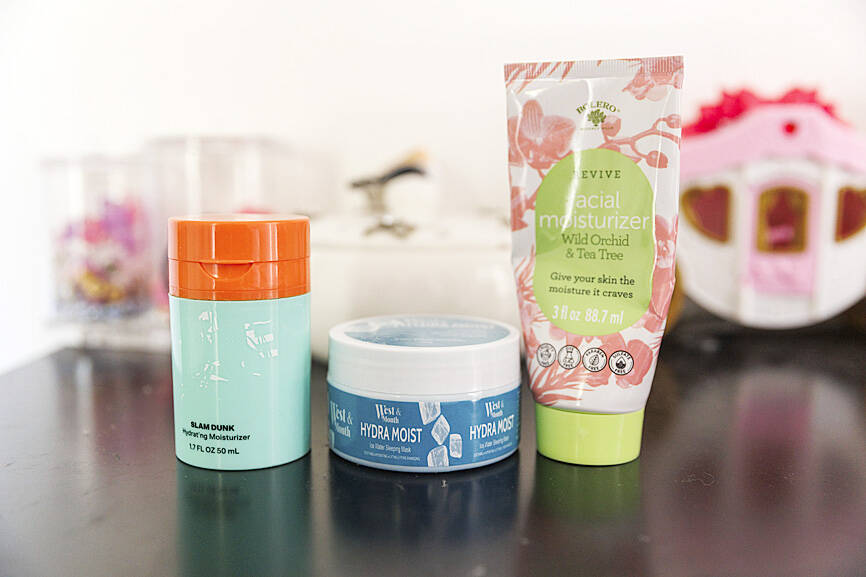When she was in fifth grade, Scarlett Goddard Strahan started to worry about getting wrinkles.
By the time she turned 10, she and her friends were spending hours on ByteDance Ltd’s TikTok and Google’s YouTube watching influencers tout products for achieving today’s beauty aesthetic: a dewy, “glowy,” flawless complexion. Goddard Strahan developed an elaborate skin care routine with facial cleansers, mists, hydrating masks and moisturizers.
One night, her skin began to burn intensely and erupted in blisters. Heavy use of adult-strength products had wreaked havoc on her skin. Months later, patches of tiny bumps remain on her face, and her cheeks turn red in the sun.

Photo: AP
“If I had known my life would be so affected by this, I never would have put these things on my face,” said Goddard Strahan, who recently turned 11.
Her experience has become common, experts said, as preteen girls around the country throng beauty stores to buy high-end skin care products.
Girls as young as eight are turning up at dermatologists’ offices with rashes, chemical burns and other allergic reactions to products not intended for children’s sensitive skin.

Photo: AP
“When kids use anti-aging skin care, they can actually cause premature aging, destroy the skin barrier and lead to permanent scarring,” said Brooke Jeffy, a Scottsdale, Arizona, dermatologist.
More than the physical harm, parents and child psychologists have voiced concerns about the trend’s effects on girls’ mental health. Extensive data suggest a fixation on appearance can affect self-esteem and body image and fuel anxiety, depression and eating disorders.
The skin care obsession offers a window into the role social media play in the lives of today’s youth and how it shapes the ideals and insecurities of girls in particular. Girls are experiencing record high levels of sadness and hopelessness.
Whether social media exposure causes or simply correlates with mental health problems is up for debate, but to older teens and young adults, it is clear: Extended time on social media has been bad for them, period.
Young girls’ fascination with makeup and cosmetics is not new. Neither are kids who hold themselves to idealized beauty standards.
What is different is the magnitude, said Kris Perry, executive director of Children and Screens, a nonprofit that studies how digital media affects child development.
“Girls are being bombarded with idealized images of beauty that establish a beauty standard that could be very hard — if not impossible — to attain,” Perry said.
The obsession with skin care is about more than the pursuit of perfect skin, 14-year-old Mia Hall said.
It is about belonging to a community that has the lifestyle and look you want, said Hall, a New Yorker from the Bronx.
Skin care was not on her radar until she started eighth grade last year. At school and on social media, girls bonded over their skin care routines.
“I felt like it was the only way I could fit in,” she said.
Hall started following beauty influencers on TikTok. Some influencers are paid by brands to promote their products, but they do not always mention that.
She started saving her US$20 weekly allowance for trips to Sephora. Her daily routine included a face wash, facial mist, hydrating serum, pore-tightening toner, moisturizer and sunscreen.
The level of detail and information girls are getting from beauty tutorials sends a troubling message as they are going through puberty and seeking their identities, said Charlotte Markey, a body image expert and Rutgers University psychology professor.
“The message to young girls is that ‘You are a never-ending project to get started on now,’” Markey said.
The beauty industry has been cashing in. Last year, consumers younger than 14 drove 49 percent of drug store skin sales, according to a NielsonIQ report that found households with teens and tweens were outspending the average US household on skin care.
In the first half of this year, one-third of “prestige” beauty sales, at stores such as Sephora, were driven by households with tweens and teens, market research firm Circana said.
The industry has acknowledged that certain products are not suitable for children, but has done little to stop kids from buying them.
The Web site of cosmetics brand Drunk Elephant states that children 12 and younger should not use their anti-aging serums, lotions and scrubs. That guidance is on the site’s FAQ page; there are no such warnings on the products themselves.
Ingredients such as retinol and chemical exfoliants such as hydroxy acids are inherently harsh. For aging skin, they are used to stimulate collagen and cell production.
Young skin can react with redness, peeling and burning that can lead to infections, acne and hypersensitivity if used incorrectly, dermatologists said.
Hall’s mother, Sandra Gordon, noticed dark patches on her face in spring and became alarmed. She threw all her daughter’s products into the trash.
Hall was not happy, but as she starts high school, she said she feels her mother was right.
She is using just a face wash and moisturizer and said that her complexion has improved.
In Sacramento, California, Goddard Strahan missed signs the products were hurting her skin: She developed a rash and felt a stinging sensation.
She said she figured she was not using enough of the products, so she layered on more.
That is when her cheeks erupted in blistering pain.
When her mother, Anna Goddard, read the ingredients in each product, she was shocked to find retinol in products that appeared to be marketed to children — including one with a cat’s face on the packaging.
Now, what worries her mother most is the psychological consequences. Kids’ comments at school have caused lingering anxiety and self-consciousness.
Goddard said she hopes to see more protections.
“I didn’t know there were harmful ingredients being put in skin care that is marketed to kids,” she said. “There has to be some type of warning.”

Intel Corp chief executive officer Lip-Bu Tan (陳立武) is expected to meet with Taiwanese suppliers next month in conjunction with the opening of the Computex Taipei trade show, supply chain sources said on Monday. The visit, the first for Tan to Taiwan since assuming his new post last month, would be aimed at enhancing Intel’s ties with suppliers in Taiwan as he attempts to help turn around the struggling US chipmaker, the sources said. Tan is to hold a banquet to celebrate Intel’s 40-year presence in Taiwan before Computex opens on May 20 and invite dozens of Taiwanese suppliers to exchange views

Application-specific integrated circuit designer Faraday Technology Corp (智原) yesterday said that although revenue this quarter would decline 30 percent from last quarter, it retained its full-year forecast of revenue growth of 100 percent. The company attributed the quarterly drop to a slowdown in customers’ production of chips using Faraday’s advanced packaging technology. The company is still confident about its revenue growth this year, given its strong “design-win” — or the projects it won to help customers design their chips, Faraday president Steve Wang (王國雍) told an online earnings conference. “The design-win this year is better than we expected. We believe we will win

Chizuko Kimura has become the first female sushi chef in the world to win a Michelin star, fulfilling a promise she made to her dying husband to continue his legacy. The 54-year-old Japanese chef regained the Michelin star her late husband, Shunei Kimura, won three years ago for their Sushi Shunei restaurant in Paris. For Shunei Kimura, the star was a dream come true. However, the joy was short-lived. He died from cancer just three months later in June 2022. He was 65. The following year, the restaurant in the heart of Montmartre lost its star rating. Chizuko Kimura insisted that the new star is still down

While China’s leaders use their economic and political might to fight US President Donald Trump’s trade war “to the end,” its army of social media soldiers are embarking on a more humorous campaign online. Trump’s tariff blitz has seen Washington and Beijing impose eye-watering duties on imports from the other, fanning a standoff between the economic superpowers that has sparked global recession fears and sent markets into a tailspin. Trump says his policy is a response to years of being “ripped off” by other countries and aims to bring manufacturing to the US, forcing companies to employ US workers. However, China’s online warriors